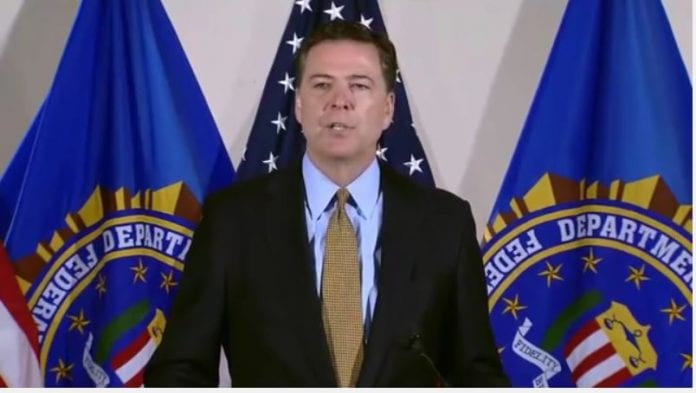The Federal Bureau of Investigation (FBI) recommended that no criminal charges will be filed against Hillary Clinton over her use of private-email server during her tenure as Secretary of State.
The FBI investigated whether the presumptive Democratic presidential nominee mishandled classified information by using a private server for her personal and governmental communications.
Mrs. Clinton apologized last year for using the server and said she should have used two e-mail accounts—one for State Department business and another for personal matters. She said, “I have said many times it was a mistake and if I could go back I would do it differently.” She also explained that her use of a private email was allowed and the e-mails she handled were not marked classified at the time.
Clinton and staff extremely careless in handling sensitive information
Today, FBI Director James Comey said the investigation found evidence that Mrs. Clinton and her staff were extremely careless in handling very sensitive, highly-classified information.
The agency identified at least 110 emails contained classified information when those were sent and could have been exposed to hackers. The presumptive Democratic presidential nominee voluntarily went to the FBI for a 3 ½ interview regarding her e-mails on Saturday.
According to Director Comey, Mrs. Clinton increased the risk of her communications being intercepted by hostile nations by choosing not use a government server. He pointed out that any person on her position should know that an unclassified system was not acceptable given the sensitivity of information she handled at the top U.S. diplomat.
The FBI did not find direct evidence that Mrs. Clinton’s emails were hacked successfully. However the agency “assess that hostile actors gained access to the private commercial e-mail accounts of people with whom Secretary Clinton was in regular contact from her personal account.”
No reasonable prosecutor would bring charges against Clinton
Director Comey said no reasonable prosecutor would bring charges against Mrs. Clinton even if there is a potential violence regarding the statutes of handling classified information.
He explained that prosecutors consider several factors before making a decision whether to bring charges including the strength of the evidence especially regarding intent, the context of a person’s actions, and how similar situations have been handled in the past.
Director Comey emphasized, “In looking back at our investigations, into the mishandling or removal of classified information, we cannot find a case that would support bringing criminal charges on these facts.”
“All the cases prosecuted involved some combination of clearly intentional and willful mishandling of classified information or vast quantities of information exposed in such a way that support inference of intentional misconduct or indication of disloyalty to the United States or efforts to obstruct justice. We do not see those things here,” added Director Comey.
Director Comey further stated, “We are expressing to Justice our view that no charges are appropriate in this case.” He also assured Americans that the FBI conducted its investigation on Mrs. Clinton’s emails “honestly and independently.”
Reactions to the FBI recommendation
In an interview with Bloomberg, Stephen Vladeck, a professor of national security law at the University of Texas in Austin, commented that the FBI investigation showed “there is a wide gap between what is stupid and what is illegal.”
Professor Vladeck added that all along he believed that the filing of any criminal case against Mrs. Clinton was a “real long shot” even if the FBI Director highlighted her carelessness in handling sensitive information.
“We don’t have a criminal statute that generally prohibits the mishandling of government communications,” or the mishandling of classified information. Maybe we should, but the FBI can only look at the laws that are on the books,” said Professor Vladeck.









